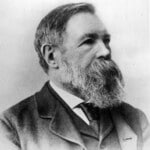About the text:
From: On Colonies, Industrial Monopoly and Working Class Movement, Futura, 1972, 57 p., p. 44-45.
(Extract)
… The Manifesto of the Democratic Federation In London has been issued by about twenty to thirty little societies, which under different names (always the same people) have for the last twenty years at least been repeatedly trying, and always with the same lack of success, to make themselves important. The only thing important is that now at last they are obliged openly to proclaim our theory as their own, whereas during the period of the International it seemed to them to be foisted on them from outside, and that recently a lot of young people stemming from the bourgeoisie have appeared on the scene who; to the disgrace of the English workers it must be said, understand things better and take them up more enthusiastically than the workers themselves. For even in the Democratic Federation the workers for the most part accept the new programme only unwillingly and as a matter of form. The leader of the Democratic Federation, Hyndman, is an arch-conservative and an arrantly chauvinistic but not stupid careerist, who behaved pretty shabbily to Marx (to whom he had been introduced by Rudolf Meyer) and for this reason was dropped by us personally. Do not on any account whatever let yourself be bamboozled into thinking there is a real proletarian movement going on here. I know Liebknecht is trying to delude himself and all the world about this, but it is not the case. The elements at present active may become important now that they have accepted our theoretical programme and so acquired a basis, but only if a spontaneous movement breaks out here among the workers and they succeed in getting control of it. Till then they will remain individual minds, with a hotch-potch of confused sects; remnants of the great movement of the forties, standing behind them, and nothing more. And – apart from the unexpected – a really general workers’ movement will come into existence here only when the workers feel that England’s world monopoly is broken. Participation in the domination of the world market was and is the economic basis of the political nullity of the English workers. The tail of the bourgeoisie in the economic exploitation of this monopoly but nevertheless sharing in its advantages, they are, of course, politically the tail-of the “Great Liberal Party,” which for its part pays them small attentions, recognises Trade Unions and strikes as legitimate factors, has abandoned the fight for an unlimited working-day and has given the mass of better-off workers the vote. But once America and the joint competition of the other industrial countries make a big enough breach in this monopoly (and in iron this is coming rapidly, in cotton unfortunately not as yet) you will see a lot of things happen here.
—–
MESC p. 364.
MEOB p. 561.
The complete text can be found online at Marxist Internet Archive, MIA.

























